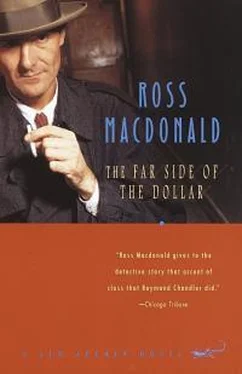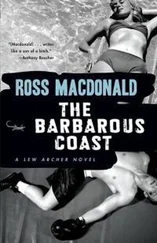“All the ones in this line are totaled out,” Ringo said. “This is the Carlson job, second from the end. That Pontiac came in since. Head-on collision, two dead.”
He shuddered. “I never go on the highway when I can help it.”
“What caused the accident to the Carlson car?”
“It was taken for a joy ride by one of the neighbors’ kids, a boy name of Hillman. You know how these young squirts are – if it isn’t theirs, they don’t care what happens to it. According to the traffic detail, he missed a curve and went off the road and probably turned it over trying to get back on. He must of rolled over several times and ended up against a tree.”
I walked around the end of the line and looked over the Dart from all sides. There were deep dents in the roof and hood and all four fenders, as if it had been hit with random sledgehammers. The windshield was gone. The doors were sprung.
Leaning in through the left-hand door, I noticed an oval piece of white plastic, stamped with printing, protruding from the space between the driver’s seat and the back. I reached in and pulled it out. It was a brass door key. The printing on the plastic tab said: DACK’S AUTO COURT 7.
“Watch the glass in there,” Ringo said behind me. “What are you looking for?”
I put the key in my pocket before I turned around. “I can’t figure out why the boy didn’t get hurt.”
“He had the wheel to hang on to, remember. Lucky for him it didn’t break.”
“Is there any chance he wrecked the car on purpose?”
“Naw. He’d have to be off his rocker to do that. Course you can’t put anything past these kids nowadays. Can you, Lion?”
He stooped to touch the dog’s head and went on talking, either to it or to me. “My own son that I brought up in the business went off to college and now he don’t even come home for Christmas some years. I got nobody to take over the business.”
He straightened up and looked around at his wrecks with stern affection, like the emperor of a wasteland.
“Could there have been anybody with him in the car?”
“Naw. They would of been really banged up, with no seat belts and nothing to hang on to.”
He looked at the sky, and added impatiently: “I don’t mind standing around answering your questions, mister. But if you really want the dope on the accident, talk to the traffic detail. I’m closing up.”
It was ten minutes to five. I made my way back to The Barroom Floor. Somebody had turned on a few lights inside. The front door was still locked. I went back to my car and waited. I took out the Dack’s Auto Court key and looked at it, wondering if it meant anything. It could have meant, among other farfetched possibilities, that the handsome Mrs. Carlson was unfaithful to her husband.
Shortly after five a short dark man in a red jacket unlocked the front door of The Barroom Floor and took up his position behind the bar. I went in and sat down on a stool opposite him. He seemed much taller behind the bar. I looked over it and saw that he was standing on a wooden platform about a foot off the floor.
“Yeah,” he said “it keeps me on the level. Without it I can barely see over the bar.”
He grinned. “My wife, now, is five foot six and built in proportion. She ought to be here now,” he added in a disciplinary tone, and looked at the wristwatch on his miniature wrist. “What will you have?”
“Whisky sour. You own this place?”
“Me and the wife, we have an interest in it.”
“Nice place,” I said, though it wasn’t particularly nice. It was no cleaner and no more cheerful than the average bar and grill with cabaret pretensions. The old waiter leaning against the wall beside the kitchen door seemed to be sleeping on his feet.
“Thank you. We have plans for it.”
As he talked, he made my drink with expert fingers. “You haven’t been in before. I don’t remember your face.”
“I’m from Hollywood. I hear you have a pretty fair jazz combo.”
“Yeah.”
“Will they be playing tonight?”
“They only play Friday and Saturday nights. We don’t get the weekday trade to justify ’em.”
“What about the Sunday jam sessions? Are they still on?”
“Yeah. We had one yesterday. The boys were in great form. Too bad you missed them.”
He slid my drink across the bar. “You in the music business?”
“I represent musicians from time to time. I have an office on the Strip.”
“Sam would want to talk to you. He’s the leader.”
“Where can I get in touch with him?”
“I have his address somewhere. Just a minute, please.”
A couple of young men in business suits with rain-sprinkled shoulders had taken seats at the far end of the bar. They were talking in carrying voices about a million-dollar real-estate deal. Apparently it was somebody else’s deal, not theirs, but they seemed to enjoy talking about it.
The small man served them short whiskies without being asked. A lavishly built young woman came in and struggled out of a transparent raincoat, which she rolled up and tossed under the bar. She had a Sicilian nose. Her neck was hung with jewelry like a bandit princess’s.
The small man looked at her sternly. “You’re late. I can’t operate without a hostess.”
“I’m sorry, Tony. Rachel was late again.”
“Hire another baby sitter.”
“But she’s so good with the baby. You wouldn’t want just anybody feeding him.”
“We won’t talk about it now. You know where you’re supposed to be.”
“Yes, Mr. Napoleon.”
With a rebellious swing of the hip, she took up her post by the door. Customers were beginning to drift in by twos and fours. Most of them were young or young middle-aged. They looked respectable enough. Talking and laughing vivaciously, clinking her jewelry, the hostess guided them to the red-checked tables.
Her husband remembered me after a while. “Here’s Sam Jackman’s address. He has no phone, but it isn’t far from here.”
He handed me a sheet from a memo pad on which he had written in pencil: “169 Mimosa, apt. 2.”
It was near the railroad tracks, an old frame house with Victorian gingerbread on the facade half chewed away by time. The heavy carved front door was standing open, and I went into the hallway, feeling warped parquetry under my feet. On a closed door to my right, a number 2 stamped from metal hung upside down by a single nail. It rattled when I knocked.
A yellow-faced man in shirt sleeves looked out. “Who is it you want?”
“Sam Jackman.”
“That’s me.”
He seemed surprised that anybody should want him. “Is it about a job?”
He asked the question with a kind of hollow hopefulness that answered itself in the negative.
“No, but I want to talk to you about something important, Mr. Jackman.”
He caught the “mister” and inclined his head in acknowledgment. “All right.”
“May I come in? My name is Lew Archer. I’m a private detective.”
“I dunno, the place is a mess. With the wife working all day – but come on in.”
He backed into his apartment, as if he was afraid to expose his flank. It consisted of one large room, which might once have been the drawing room of the house. It still had its fine proportions, but the lofty ceiling was scabbed and watermarked, the windows hung with torn curtains. A cardboard wardrobe, a gas plate behind a screen, stood against the inner wall. Run-down furniture, including an unmade double bed in one corner, cluttered the bare wooden floor. On a table beside the bed, a small television set was reeling off the disasters of the day in crisp elocutionary sentences.
Jackman switched it off, picked up a smoking cigarette from the lid of a coffee can on the table, and sat on the edge of the bed. It wasn’t a marihuana cigarette. He was completely still and silent, waiting for me to explain myself. I sat down facing him.
Читать дальше












